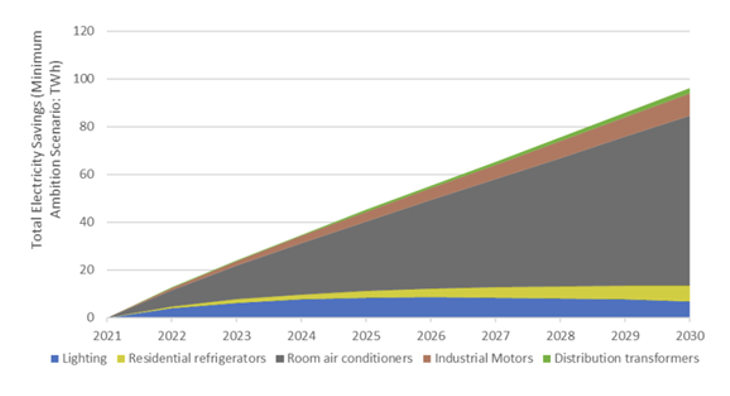Menu
The air conditioning market in ASEAN is set for significant growth, posing economic and environmental challenges. The ASEAN Roadmap towards Sustainable and Energy-Efficient Space Cooling projects a surge in air conditioner usage, with Indonesia accounting for half of the anticipated 300 million units by 2040. The Indonesia’s air conditioner market is projected to reach a valuation of USD 1.87 billion by 2027, driving the need for energy-conscious policies to ensure sustainable development in ASEAN.
The role of Minimum Energy Performance Standards (MEPS):
Air conditioners contribute significantly to regional electricity demand, consuming 5 TWh annually. This underscores the importance of enforcing Minimum Energy Performance Standards (MEPS) to improve energy efficiency. By implementing stringent MEPS, governments can reduce the need for additional power plants, lower emissions, and deliver substantial cost savings to consumers. Well-designed and properly implemented MEPS play a vital role in addressing energy consumption and environmental sustainability challenges in the region.
Driving energy efficiency and environmental benefits:
Stricter MEPS enforcement, combined with energy efficiency measures like efficient fans and building envelope improvements, can save ASEAN Member States (AMS) 110 TWh of electricity by 2040. This translates to a more than one-third reduction in projected space cooling energy use, equivalent to the current combined electricity consumption of several countries in the region. Moreover, these actions could lead to a reduction of over 55 million tonnes of CO2 emissions in 2040, potentially surpassing 2018 levels when coupled with a transition to decarbonised electricity sources.
AMS have made progress toward meeting the current Regional Policy Roadmap’s goals. Indonesia, Malaysia, the Philippines, Thailand, and Viet Nam have embraced the International Organisation for Standardisation (ISO) 5151 and ISO 16358 as national standards. Additionally, Cambodia, Lao PDR, and Myanmar have incorporated references to ISO 5151 and ISO 16358 within their draft regulations on MEPS and labelling for air conditioners.
Unlocking energy savings and market potential:
To unleash the substantial energy-saving potential of efficient air conditioners even further, ASEAN has committed to updating the regional roadmap on energy-efficient air conditioners. The Recommendations for Updating the ASEAN Regional Policy Roadmap on Energy Efficient Air Conditioners propose the establishment of a harmonised regional MEPS, aiming for a Coefficient of System Performance (CSPF) of 3.7 Wh/Wh by 2023 and a CSPF of 6.09 Wh/Wh by 2025. Implementing these measures will unlock additional environmental benefits and foster sustainable development within the ASEAN region.
Using a stock model analysis, the ACE U4E Energy Saving Assessment forecasted the impacts of implementing policies that improve the MEPS for cooling appliances at a regional level. The analysis applies a bottom-up approach to calculate prospective energy savings based on the stock and sales of air conditioners, average unit energy consumption, and macroeconomic indicators. The study estimates that energy-efficient air conditioners in ASEAN could save 342 TWh of electricity consumption annually by 2030, resulting in substantial cost savings and a reduction of 240 million tonnes of CO2 emissions.
 Annual Saving by year to 2030
Annual Saving by year to 2030Market analysis and efficiency progress:
A thorough assessment of energy-efficient air conditioner availability in ASEAN, with a specific focus on Indonesia, Malaysia, Singapore, and Thailand, was conducted. A total of 5,963 residential AC (RAC) models were examined, and among them,1,297 models fell within the scope of the regional roadmap for air conditioners with cooling capacity below 3.52 kW. Notably, these air conditioner models with a cooling capacity of 3.52 kW exhibited higher efficiency than the current ASEAN Regional MEPS of ISO CSPF 3.08. Impressively, 96% of the evaluated RAC models (1,248 models) met the current ASEAN Regional MEPS requirement.
Furthermore, the assessment explored higher efficiency thresholds—20%, 50%, and 98% more efficient than the current ASEAN Regional MEPS—and found that approximately 8% of the AC models currently available in these four countries (around 100 models) are already more efficient than ISO CSPF 6.09. Additionally, based on the product registration data from the Ministry of Energy and Mineral Resources (ESDM) of Indonesia as of April 2023, approximately 35% of the current air conditioner models in the domestic market meet the ASEAN MEPS phase 1 requirements of 3.7 W/W. These findings indicate that energy-efficient options are already present in the market, including in Indonesia, highlighting an opportunity to avoid establishing energy-efficiency targets that lack ambition.
In the ASEAN region, Thailand, Malaysia, and Singapore lead as mature markets for air conditioners, while Indonesia, the Philippines, and Viet Nam drive revenue growth. Notably, Indonesia’s air conditioner market has experienced rapid growth trends, driven by a growing middle class seeking improved living standards. Despite a temporary decline due to the pandemic, the market has rebounded, and manufacturers are responding by innovating and offering energy-efficient products, supported by government regulations on refrigerants.
Adopting ambitious energy efficiency targets and adhering to the proposed timeline will bring multiple benefits to the region. It will reduce energy demand, lower emissions, and support the ASEAN Plan of Action for Energy Cooperation (APAEC) 2016-2025’s goal of lowering regional energy intensity. With the growing demand for air conditioners, the widespread adoption of stringent MEPS offers significant potential for energy savings. ASEAN can explore harmonisation and cooperation to establish new, ambitious MEPS levels while strengthening the existing regional roadmap. It is crucial to conduct a thorough review of the proposed timeline for phased implementation, considering each country’s unique national circumstances. Given Indonesia’s significant share in the fast-growing air conditioner market, Strict enforcement of higher MEPS in Indonesia will contribute to energy intensity reduction targets and stimulate growth in the domestic air conditioner market.
